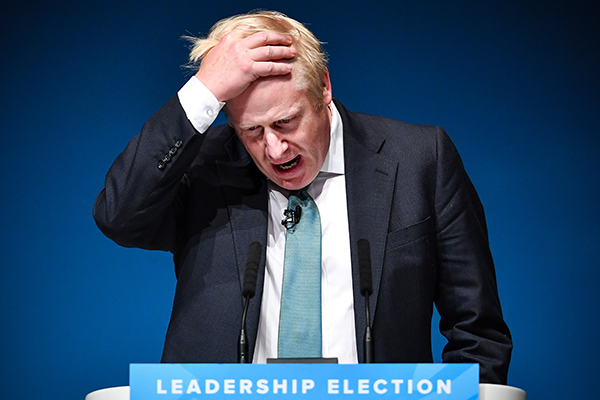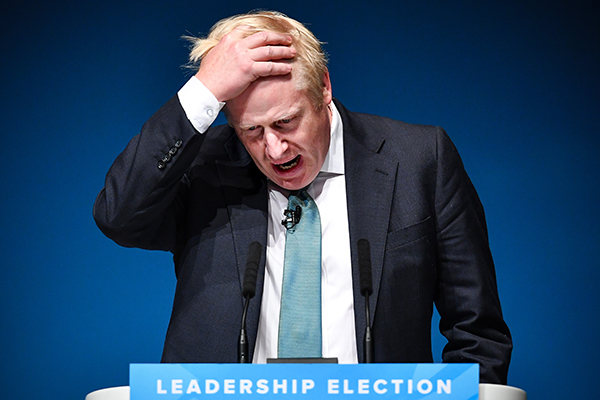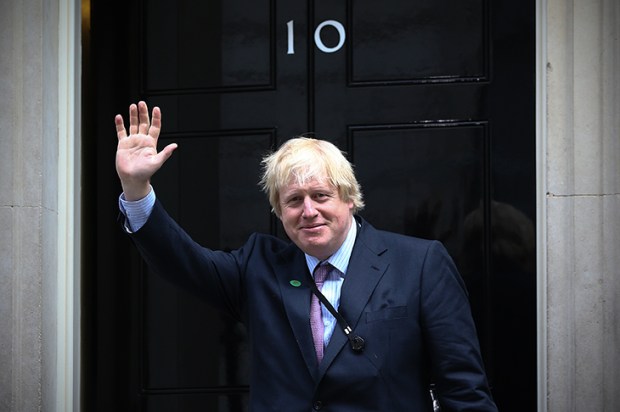After being backed by a majority of Tory MPs, Boris Johnson now looks set to win over party members by an even larger margin. Surveys suggest he will hoover up between two thirds and three quarters of the vote. A Tory leader with such a mandate would, normally, start his premiership with huge amounts of political capital and be able to dictate terms to their opponents within the party. But Johnson will have to watch his back from the moment he crosses the threshold of No. 10.
Most new prime ministers arrive with a decent majority. Johnson will be clinging to power from day one. Even with the DUP, the government has a working majority of just five MPs. That might go down to just three after the Brecon and Radnorshire by-election next month. It’s taking place because Chris Davies, the Tory MP, was caught fiddling his expenses and his constituents were so angry that they successfully petitioned to have him removed. Such conditions do not augur well for a Tory victory this time especially as Davies is their candidate.
Aggravating the problems caused by the parliamentary arithmetic are two political diseases in wide circulation: Brexit derangement syndrome and Boris derangement syndrome. Many Tories are being driven to distraction by both. A handful even think that bringing down their own government and ushering in a general election is preferable to no deal, even if that might mean a Jeremy Corbyn premiership and another Scottish independence referendum. It’s still a fringe position: even Sir Oliver Letwin, a hardened anti-Brexit rebel, concedes a Corbyn government is unlikely to offer better solutions. A Corbyn/McDonnell government may well lead to chaos that puts any Brexit effect in the shade: if property rights were undermined, it would strike at the very heart of this country’s international reputation.
Boris Johnson wants all prospective cabinet ministers to sign up to his Brexit policy, so all of them must say they are ready for the United Kingdom to leave without a deal on 31 October if needs be. Theresa May’s negotiating strategy was weakened by arguments in her cabinet, which meant the EU doubted May’s ability to deliver on any deal. Nor did they believe that she would stand by her policy that ‘no deal was better than a bad deal’.
Collective responsibility is not the same as ideological purity, though. It doesn’t mean every minister has to believe in the same policy. It means that they abide by it and defend it, both in public and private, and stick with the government line when things get tough.
Johnson has fretted to confidants that ministers might sign up to his no deal policy to start with but go wobbly as the Brexit deadline draws closer, resigning at the government’s moment of maximum vulnerability. This is an understandable concern; he and David Davis successfully destabilised May’s Brexit strategy by resigning after her Chequers plan. She was further weakened later by the resignations of Dominic Raab and Esther McVey. However, none of them had publicly signed up to these policies in advance. If ministers say in public that they back leaving on 31 October come what may, it will be harder for them to say later that they have changed their minds and want to resign.
Johnson should learn two lessons from May when it comes to appointing his cabinet. First, she appointed people who were loyal to her — but who were not, really, up to the job. He must avoid having his own version of Karen Bradley. May’s other problem was that even at her zenith she was fearful of being upstaged by members of her cabinet. This meant she’d undermine them, blocking them from bringing in the advisers they wanted. She used No. 10 to keep her ministers on the tightest of leashes and did her best to make sure no one else would shine.
One of Johnson’s great political strengths is that he is not afraid of talent or ambition. It is not a coincidence that two of his deputy mayors — Kit Malthouse and James Cleverly — threw their hats into the ring in this Tory leadership contest. He must continue this approach in Downing Street and be happy to let ministers have their own triumphs: their successes will reflect well on him. He can be confident that his political persona and the challenges he’ll face as soon as he takes office means he won’t be overshadowed by any member of his ministry.
Perhaps the most important appointment will be the chief Brexit negotiator. I understand that Geoffrey Cox, the Attorney General, is currently leading the work on how to negotiate with the EU — and handle parliament. When he went to Brussels to try to salvage May’s deal, he argued for a change to the backstop that would see it cease to apply if trade talks between the UK and the EU irrevocably broke down. Had he succeeded, parliament may well have passed May’s deal. Those close to Cox believe that he was making some progress with Michel Barnier over this demand until No. 10 decided this part of the deal was non-negotiable and ordered Cox to back off.
But if Cox is redeployed this time, and finishes what he started, might we end up with a tweaked version of May’s deal? Johnson sometimes speaks as if he wants to abandon the Withdrawal Agreement entirely. (‘It is, as they say in Brussels, caduque.’) However, even he voted for this deal the third time it was brought to parliament. His logic, then, was that it would do for now, and could be replaced later with a very different deal negotiated by a new prime minister.
This logic remains sound. When we asked him last week if he would accept a modified version of May’s deal, he replied it was essential that Britain is not locked in either the customs union or the single market. A Cox compromise would mean we would not be permanently stuck in anything.
Once Brexit is legally completed, much of the air would go out of Nigel Farage and the Brexit party’s balloon. A general election would then be on the cards; especially if Johnson wants to be free of the constraints of a hung parliament.
A no-deal Brexit would be a massive gamble for everyone involved. But a Brexit deal, perhaps achieved by a Cox compromise, could offer the easiest and safest route out of the current mess. If Boris Johnson wants a lengthy stay in No. 10, he must calibrate his Brexit demands carefully.
Got something to add? Join the discussion and comment below.
Get 10 issues for just $10
Subscribe to The Spectator Australia today for the next 10 magazine issues, plus full online access, for just $10.
You might disagree with half of it, but you’ll enjoy reading all of it. Try your first month for free, then just $2 a week for the remainder of your first year.















Comments
Don't miss out
Join the conversation with other Spectator Australia readers. Subscribe to leave a comment.
SUBSCRIBEAlready a subscriber? Log in